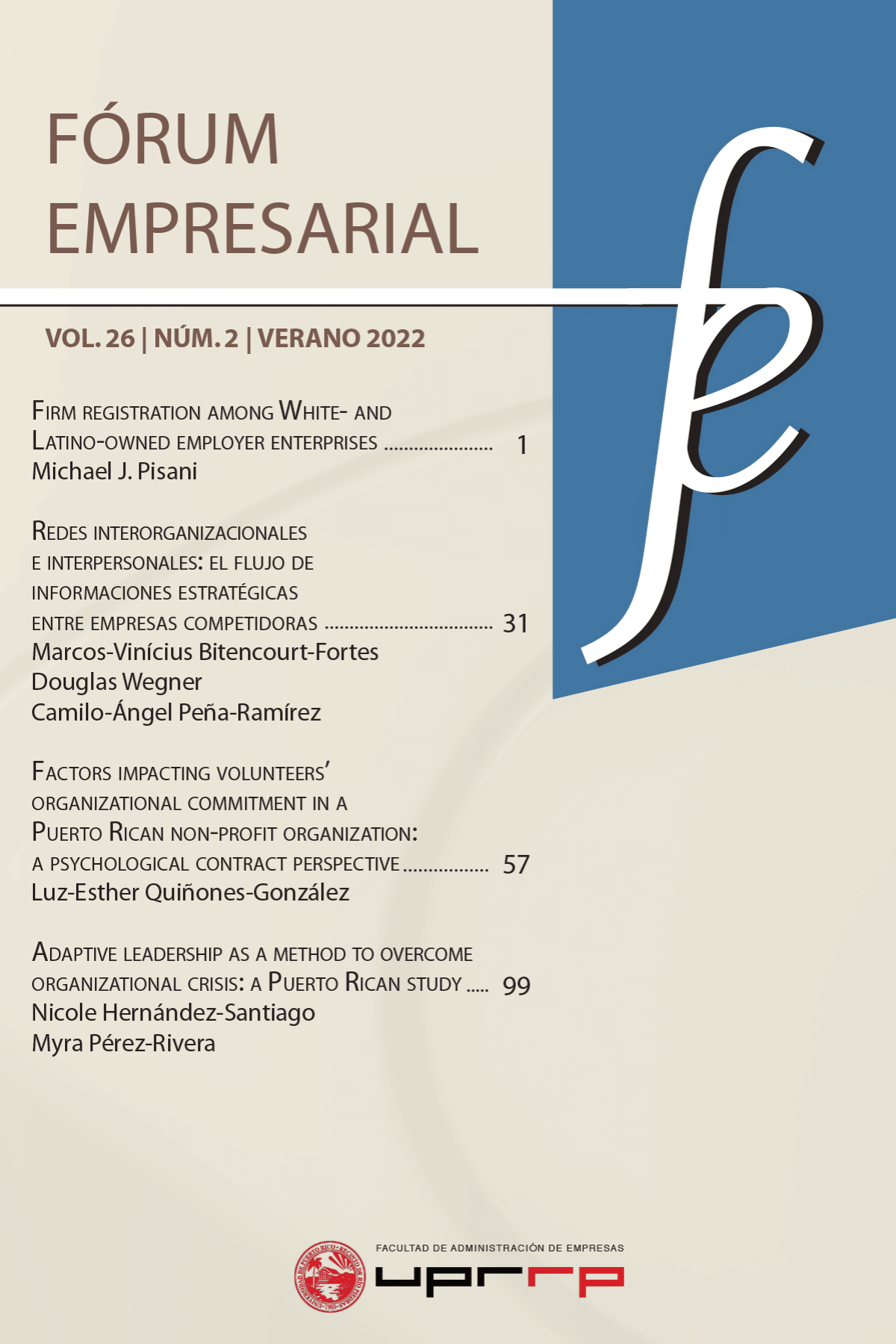Resumen
Este estudio examina el alcance y los determinantes del registro de firmas entre las empresas de empleadores blancos y latinos en los EEUU. Los datos primarios se derivan de la encuesta representativa a nivel nacional de 7,645 empresas de la Iniciativa Empresarial Latina de Stanford de 2020. Los determinantes del registro de empresas se derivan de la demografía del empresario y las características de la mediante una regresión logística binomial para predecir las probabilidades de pertenencia a un grupo de empresas empleadoras (no) registradas. En total, 80% de las empresas empleadoras están registradas. Las empresas de propiedad de inmigrantes y latinos superan los niveles de registro de las empresas de blancos y nativos. Las empresas de empleadores más grandes por ventas anuales y número de empleados tienen más probabilidades de estar registradas que sus contrapartes comerciales más pequeñas.
Citas
Andreas, P. (2013). Smuggler nation: how illicit trade made America. Oxford University Press.
Benería, L. (1989). Subcontracting and employment dynamics in Mexico City. In A. Portes, M. Castells, & L. A. Benton (Eds.), The informal economy: studies in advanced and less developed countries. (pp. 173–199). The Johns Hopkins University Press.
Carter, J., James, K., Kidwell, R., Camp, K., & Young, M. (2019). HRM practices and effectiveness: a comparison of US Hispanic and non-Hispanic family firms. Journal of Small Business and Enterprise Development, 26(5), 726–746. https://doi.org/10.1108/JSBED-12-2018-0364
De Soto, H. (1989). The other path: the economic answer to terrorism. Basic Books.
De Soto, H. (2000). The mystery of capital: why capitalism triumphs in the west and fails everywhere else. Basic Books. Hart, K. (1970). Small scale entrepreneurs in Ghana and development planning. Journal of Development Planning, 6(4),104– 120. https://doi.org/10.1080/00220387008421338
Hart, K. (1973). Informal income opportunities and urban employment in Ghana. Journal of Modern Africa Studies, 11(1), 61–89. https://doi.org/10.1017/S0022278X00008089
Klapper, L., Love, I., & Douglas, R. (2014). New firm registration and the business cycle (Policy Research Working Paper 6775). The World Bank. http://documents1.worldbank.org/curated/en/911411468331898446/pdf/WPS6775.pdf
Losby, J. L., Else, J. F., Kingslow, M. E., Edgcomb, E. L., Malm, E. T., & Kao, V. (2002). Informal economy literature review. Aspen Institute. https://www.aspeninstitute.org/wp-content/uploads/2017/04/InformalEconomyLiteratureReview.pdf
Medina, L., & Schneider, F. (2018). Shadow economies around the world: what did we learn over the last 20 years? (IMF Working Papers, No. 18/17). International Monetary Fund. https://www.imf.org/en/Publications/WP/Issues/2018/01/25/Shadow-Economies-Around-the-World-What-Did-We-Learn- Over-the-Last-20-Years-45583
Orozco, M., Tareque I. S., Oyer, P., & Porras, J. I. (2021). State of Latino entrepreneurship: 2020 research report. Stanford Latino Entrepreneurship Initiative. https://www.gsb.stanford.edu/facultyresearch/publications/state-latino-entrepreneurship-2020.
Pagán, J. A., & Tijerina-Guajardo, J. A. (2000). Increasing wage dispersion and the changes in relative employment and wages in Mexico’s urban informal sector 1987-1993. Applied Economics, 32(3), 335–347. https://doi.org/10.1080/000368400322769
Pampel, F. C. (2000). Logistic regression: a primer. Sage Publications.
Perry, G. E., Maloney, W. F., Arias O. S., Fajnzylber P., Mason A. D., & Saavedra-Chanduvi, J. (2007). Informality: exit and exclusion. The World Bank. Pisani, M. J. (2012). Latino informal immigrant entrepreneurs in South Texas: opportunities and challenges for unauthorized new venture creation and persistence. American Journal of Business, 27(1), 27–39. https://doi.org/10.1108/19355181211217625
Pisani, M. J. (2019). From informal to formal: an exploration of the firm-level determinants of sectoral graduation in El Salvador. Academia Revista Latinoamericana de Administración, 32(1), 79–92. https://doi.org/10.1108/ARLA-03-2018-0071
Pisani, M. J., & Morales A. (2020). Informality and Latino-owned businesses: a national portrait of unregistered Latino-owned businesses. Social Science Quarterly, 101(2), 588–603. https://doi.org/10.1111/ssqu.12763
Pisani, M. J., & Ovando Rivarola, F. G. (2019). Understanding the determinants of economic informality in Paraguay: a kaleidoscope of measures. Palgrave Macmillan.
Pisani, M. J., Richardson C., & Patrick, M. J. (2008). Economic informality on the U.S.-Mexican border: a (re)view from South Texas. Journal of Borderlands Studies, 23(2), 19–40. https://doi.org/10.1080/08865655.2008.9695696
Portes, A., Castells, M., & Benton, L. A. (Eds.). (1989). The informal economy: studies in advanced and less developed countries. Johns Hopkins University Press. https://org/10.1126/science.247.4943.731
Portes, A., & Schauffler, R. (1993). Competing perspectives on the Latin American informal sector. Population and Development Review, 19(1), 33–60. https://doi.org/10.2307/2938384
Richardson, C., & Michael, P. J. (2017). Batos, bolillos, pochos, and pelados: class and culture on the South Texas border (2nd ed.). University of Texas Press.
Richardson, C., & Pisani, M. J. (2012). The informal and underground economy of the South Texas Border. University of Texas Press.
Tokman, V. E. (Ed.) (1992). Beyond regulation. The informal economy in Latin America. Lynne Rienner Publishers. https://doi.org/10.1017/S0022216X00019143
Valdez, Z. (2011). The new entrepreneurs: how race, class, and gender shape American enterprise. Stanford University Press.
Williams, C. C., Martinez-Perez, A., & Kedir, A. M. (2017). Informal entrepreneurship in developing economies: the impacts of starting up unregistered on firm performance. Entrepreneurship Theory and Practice, 41(5), 773–799. https://doi.org/10.1111/etap.12238
World Bank. (2020). Doing Business 2020. https://org/10.1596/978-1-4648-1440-2

Esta obra está bajo una licencia internacional Creative Commons Atribución-NoComercial-CompartirIgual 4.0.
Derechos de autor 2022 Fórum Empresarial

